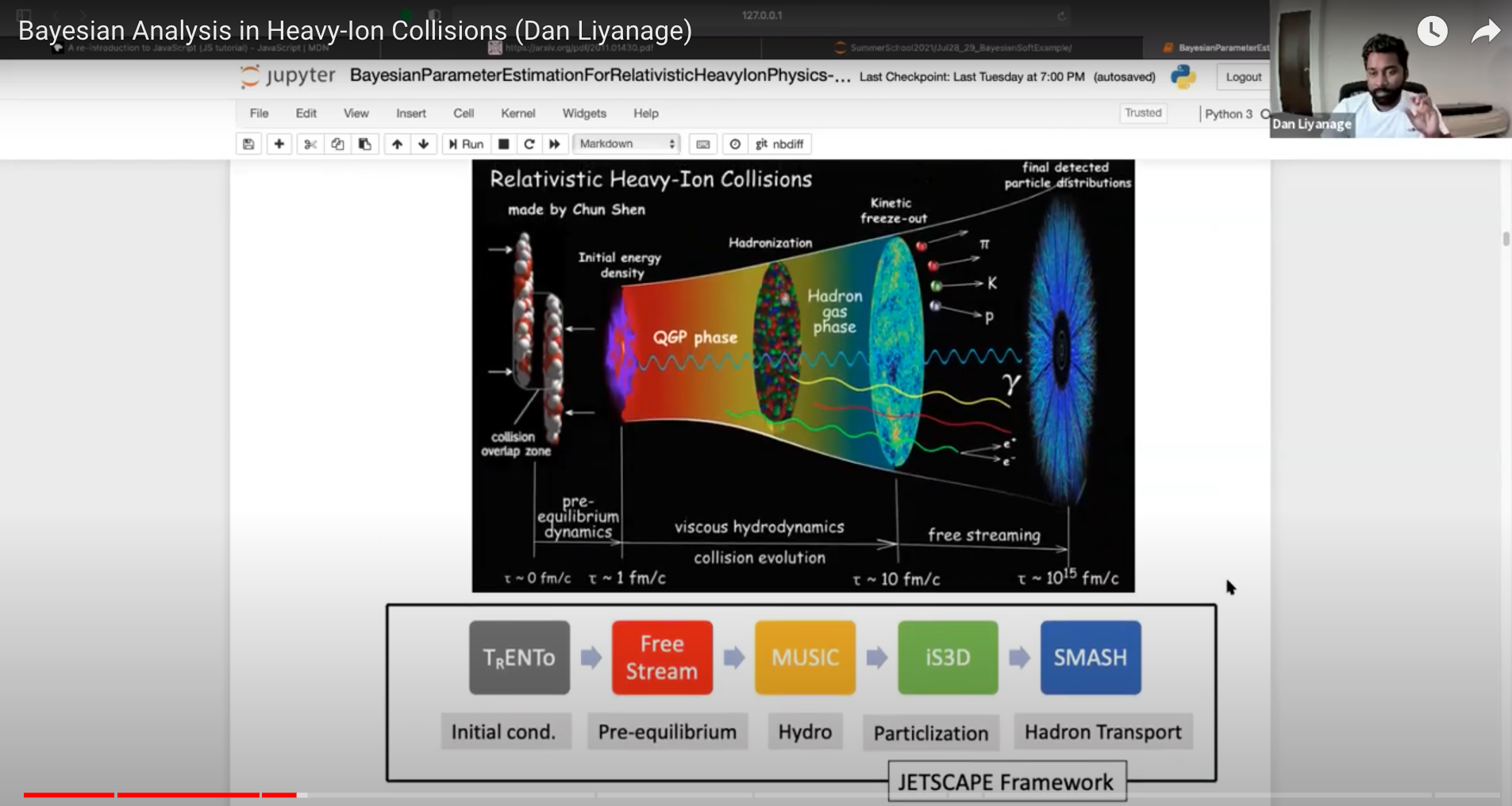Dan Liyanage

I'm a PhD candidate at the Ohio State University studying theoretical nuclear physics. I use world's fastest computers to run millions of heavy ion collision simulations and then use Bayesian statistical methods to compare them with real world data. I use machine learning to build emulators for the expensive simulations to reduce the huge computational cost. The best thing about my PhD is the opportunity I get to learn and collaborate with experts from diverse fields, such as, computer science, mathematics and physics, each and everyday.
I participated in the Erdos Datascience boot camp in 2019 and was awarded the best group project . Since then I have been working with Erdos institute closely as a mentor .
Research
- Efficient Emulation of Relativistic Heavy Ion Collisions Using Transfer Learning Techniques
Measurements from the Large Hadron Collider (LHC) and the Relativistic Heavy Ion Collider (RHIC) can be used to study the properties of quark-gluon plasma. Systematic constraints on these properties must combine measurements from different collision systems and methodically account for experimental and theoretical uncertainties. Such studies require a vast number of costly numerical simulations. While computationally inexpensive surrogate models (“emulators”) can be used to efficiently approximate the predictions of heavy ion simulations across a broad range of model parameters, training a reliable emulator remains a computationally expensive task. We use transfer learning to map the parameter dependencies of one model emulator onto another, leveraging similarities between different simulations of heavy ion collisions. By limiting the need for large numbers of simulations to only one of the emulators, this technique reduces the numerical cost of comprehensive uncertainty quantification when studying multiple collision systems and exploring different models.
- Bayesian Parameter Estimation for Relativistic Heavy Ion Collisions with Viscous Anisotopic Hydrodynamic Modeling
Click below to access the widget.

State-of-the-art hydrodynamic simulation models for relativistic heavy ion collisions are only applicable after 1fm/c or so after the collision due to large pressure gradients that are present in the early times. As a solution, pre-hydrodynamic stage which models the early stage evolution as a conformal, weekly interacting gas is used before the hydrodynamic stage. The transition from pre-hydrodynamic to the hydrodynamic stage is discontinuous and introduces a considerable theoretical ambiguity to the model. Recently a novel hydrodynamic model, Viscous Anisotropic Hydrodynamics (VAH) which can handle large pressure anisotropies has been introduced as an alternative solution. VAH is applicable at very early times of the collision and it smoothly matches to conventional second-order viscous hydrodynamics at late times. In this work, we present a Bayesian parameter estimation study for VAH model using the experimental data for Pb-Pb collisions at LHC (2.76$ TeV Energy). We find that the VAH model can fit the experimental data very well and we present the most probable values for the model parameters as constrained by the experimental data.
- Pre-hydrodynamic Phenomenology with the Isotropization Time Approximation
State-of-the-art hydrodynamic models of heavy-ion collisions have considerable theoretical model uncertainties in the description of very early times. In this manuscript, we describe a computational model based on the Boltzmann equation which can address one such source of uncertainty parametrically. Practically, Bayesian model-to-data comparisons rely on computationally efficient models, and so we focus on developing a sufficiently fast model that can incorporate the effects of non-trivial dynamics at the earliest times.
- Taweret: Python Package for Bayesian Model Mixing
Read the docs here
Machine Learning
Best group project in Erdos Data science boot camp in 2019

Teaching and Mentoring
-
JETSCAPE Summer School 2021. Click below to watch the video!

-
Hazel Brown Teaching Award, Department of Physics, The Ohio State University. For consecutive two years 2020 & 2021.
Invited Talks and Seminars
- “Bayesian calibration of viscous anisotropic hydrodynamic simulations of heavy-ion collisions”, Workshop on Information and Statistics in Nuclear Experiment and Theory (ISNET), Washington University, St.Louis, MO. 2023
- “Bayesian Parameter Estimation with Viscous Anisotropic Hydrodynamics Modeling”, Fifteenth Workshop on Particle Correlations and Femtoscopy, FRIB, Michigan State University, MI. 2022
- “Bayesian Parameter Estimation of Relativistic Heavy Ion Collisions Simulation with VAH Modeling”, Fall Meeting of the APS Division of Nuclear Physics, New Orleans, Louisiana. 2022
- “Transfer Learning for Emulation of Hydrodynamic Simulations”, Virtual Seminar for the University of Tennessee nuclear physics group. 2021
- “Bayesian Parameter Estimation for Relativistic Heavy Ion Collisions”, JETSCAPE summer school. 2021
- “Transfer Learning Emulation”, Information and Statistics in Nuclear Experiment and Theory Conference (ISNET 2021). 2021
Publications
Collaborations
- Bayesian Analysis of Nuclear Dynamics (BAND)
- Jet Energy-loss Tomography with a Statistically and Computationally Advanced Program Envelope (JETSCAPE - Simulations Working Group)

